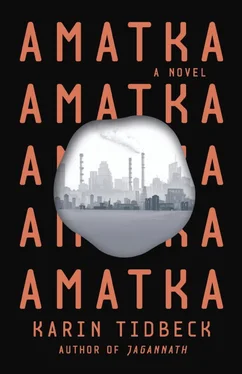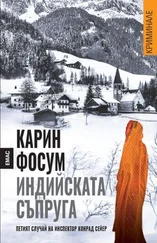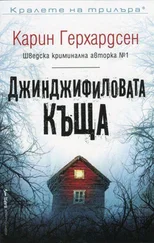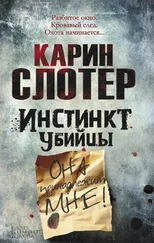Карин Тидбек - Amatka
Здесь есть возможность читать онлайн «Карин Тидбек - Amatka» весь текст электронной книги совершенно бесплатно (целиком полную версию без сокращений). В некоторых случаях можно слушать аудио, скачать через торрент в формате fb2 и присутствует краткое содержание. Город: New York, Год выпуска: 2017, ISBN: 2017, Издательство: Vintage Books, Жанр: Фантастика и фэнтези, на английском языке. Описание произведения, (предисловие) а так же отзывы посетителей доступны на портале библиотеки ЛибКат.
- Название:Amatka
- Автор:
- Издательство:Vintage Books
- Жанр:
- Год:2017
- Город:New York
- ISBN:978-1-101-97395-0
- Рейтинг книги:4 / 5. Голосов: 2
-
Избранное:Добавить в избранное
- Отзывы:
-
Ваша оценка:
- 80
- 1
- 2
- 3
- 4
- 5
Amatka: краткое содержание, описание и аннотация
Предлагаем к чтению аннотацию, описание, краткое содержание или предисловие (зависит от того, что написал сам автор книги «Amatka»). Если вы не нашли необходимую информацию о книге — напишите в комментариях, мы постараемся отыскать её.
Amatka — читать онлайн бесплатно полную книгу (весь текст) целиком
Ниже представлен текст книги, разбитый по страницам. Система сохранения места последней прочитанной страницы, позволяет с удобством читать онлайн бесплатно книгу «Amatka», без необходимости каждый раз заново искать на чём Вы остановились. Поставьте закладку, и сможете в любой момент перейти на страницу, на которой закончили чтение.
Интервал:
Закладка:
Nina stared into space for a moment. “It took us a while to find them.” She took a swig from her cup. “We bumped about in a terrain vehicle for days. And, you know, no one had ever been that far from Amatka. We were so scared something would happen to us. We drove around the lake. There was nothing out there, just water on one side and tundra on the other, but it was still terrifying. Because it didn’t end, you know. It just went on and on.” Nina gesticulated with her free hand. “Completely featureless as far as the eye could see.” She topped up her cup again and drank half of it down, shuddered, then patted her chest. “And then we saw it. It was like a hole in the sky. It grew bigger as we drew near. And when we arrived… I thought it was, I don’t know what it was. We’d come to a halt, but we just sat in there, staring like little kids. Then someone said: There are houses there. And there were, right under the hole. It looked sort of like a colony—a ring of little houses and a commune office. We put our protective suits on, the supersafe kind with visors and everything, and we stepped out of the vehicle. It was like, like a bubble. No, not a bubble. But the sky was different there, right above the houses. There were lights in the sky. I have to go to the toilet.”
Nina abruptly got up and went downstairs. When she came back, her face was flushed and her breath sour. She waved Vanja’s concern away and refilled her cup. “Okay, so we’d left the vehicle, and the expedition leader went first. She walked right up to the edge of the town. The rest of us were standing there, looking in.”
“You said it looked sort of like a colony?”
Nina shook her head. “They’d painted murals on the walls. No words, no markings. But paintings of things that don’t exist. Everywhere.”
“But the people?”
Nina was quiet for a moment. “The things we saw in there weren’t people. She, Berols’ Anna, she came up to us. That’s what it called itself, anyway. It, she, walked up to that wall. She didn’t come over to our side, but we could hear her fine.”
“But why would you say they weren’t people?”
“Because…” Nina shook her head again. “They didn’t look human anymore. They looked… sort of human? But not quite. Something about the way they moved, the way they looked at us. Like we were children.” She took a deep breath. “Berols’ Anna, when she spoke… her voice filled your head. She said three things. She said to leave them alone. And then she said…” Nina frowned.
Vanja waited.
“‘We’ve given ourselves over to the world,’” Nina said. “That’s what she said, word for word. And then the third thing: ‘We’ll come to your aid soon.’”
“What did you do next?” Vanja asked.
“What could we do? No one wanted to head inside. We returned home. The committee swore us to secrecy. Anyone who talked about what happened would be taken care of and sent away. The committee was afraid that if others got wind of what happened, they’d try the same thing, they’d try to break out. Or that talking about what happened would spread Anna’s ideas. It would destabilize the colony. So when we came home, someone torched a leisure center, and they made the official story that the missing people had died in the fire.”
Nina cleared her throat. “I’m only telling you this so you’ll get it. Is this what you want, Vanja? You want things to be like Berols’ Anna made them?”
“But maybe they’re doing well in there,” Vanja mumbled.
“They’re not human anymore. You want to stop being human, is that it?”
Vanja looked away. She had an impulse to say yes but stopped herself and instead shook her head.
Nina emptied her cup. “So, that’s that. And since that happened, it’s been harder to maintain order—just look at the lake. Maybe it’s because there are fewer of us. Or because what Berols’ Anna did changed something. I don’t know. But we can’t afford to be lax like people in Essre apparently are. Of course, there are those who slack off. Fifteen years is enough for people to start to forget. And the children aren’t told about this. They have to believe there was a fire.”
She filled her cup again. Her speech had taken on the overly precise enunciation of the very drunk. “Maybe Ivar would still have been here.”
“What?”
“Maybe Ivar would still have been here. If people had just followed the rules, then nothing would have fallen apart. Maybe that chamber wouldn’t have collapsed.”
Nina sniffled and wiped her cheeks with her palm. Then she fixed Vanja with bloodshot eyes. “I don’t want to, because I care about you. But I’ll report you if I have to. Promise me I won’t have to.”
“I promise,” Vanja said.
Nina rested her head on Vanja’s shoulder. Before long, her breathing grew more even and deepened. Vanja caught her cup the moment before it tumbled from Nina’s hand.
She lay awake for a long time with Nina’s arms wrapped around her. Ivar’s gray face haunted her. Nina couldn’t be right. Ivar was in pain because the committee forced him underground, because they wouldn’t let him live his life the way he wanted. Not because of what he saw when the tunnel caved in.
When she finally drifted off, she found herself in the cave with the machine. The luminescent lichen festooned the surfaces in white and green. Everything was very still. The dripping noise had stopped. Then the engine shuddered to life with a screeching groan. The wheel tore free of the stalactites with a crash and slowly began to turn. Lichen and minerals scattered in a cloud.
She couldn’t see what the machine powered.
SECONDAY
Anders was back. He stood behind the counter, blowing his nose into a soiled handkerchief. In front of him sat a stack of papers and folders.
“You’re on time,” he said when Vanja entered. “Good. The research division has given us work to do.” He pushed the stack toward her. “These are requisitions and permission applications. We need them in triplicate, one copy for the archive and two for the office upstairs. They need to be processed and sent back to the research division immediately. So get going.” He looked oddly exhilarated.
Anders sat down in front of his typewriter and hammered out what looked like reports. Vanja fetched blank forms and copying paper. She spent the morning translating the short messages in the stack on her right into applications. The research division was applying for equipment and workers. Their purpose wasn’t stated very clearly; they made several references to some decision that the committee had reached the day before. It had something to do with object diagnostics and emergency protocols.
By the time she had finished typing up the forms, it was already time for the midday meal. Vanja delivered the copies to the secretary upstairs and then went straight to the canteen. Today’s dish was bean stew. The atmosphere in the canteen was oddly subdued. People spoke in short, indirect bursts:
“Did you hear…?”
“Yes. I got a summons. Hedda, too.”
“One wonders what’s going on.”
“It’s probably nothing.”
“You’re right, it’s probably nothing.”
The last sentence recurred in all conversations, repeated by everyone within earshot.
In the early afternoon, a band of couriers came downstairs and filed past the reception. One of them stopped at the desk; it was the same girl with braids who had been there the day before. She waved at Vanja and Anders to get their attention, held up a note, and recited: “INCREASED MARKING. In a campaign to improve the commune’s well-being, normal activity will be suspended between fifteen and sixteen o’clock for marking of all objects in the area. This will be repeated every day until further notice. Hooray for Amatka’s commune!”
Читать дальшеИнтервал:
Закладка:
Похожие книги на «Amatka»
Представляем Вашему вниманию похожие книги на «Amatka» списком для выбора. Мы отобрали схожую по названию и смыслу литературу в надежде предоставить читателям больше вариантов отыскать новые, интересные, ещё непрочитанные произведения.
Обсуждение, отзывы о книге «Amatka» и просто собственные мнения читателей. Оставьте ваши комментарии, напишите, что Вы думаете о произведении, его смысле или главных героях. Укажите что конкретно понравилось, а что нет, и почему Вы так считаете.












![Карин Тидбек - Аматка [ЛП]](/books/438406/karin-tidbek-amatka-lp-thumb.webp)